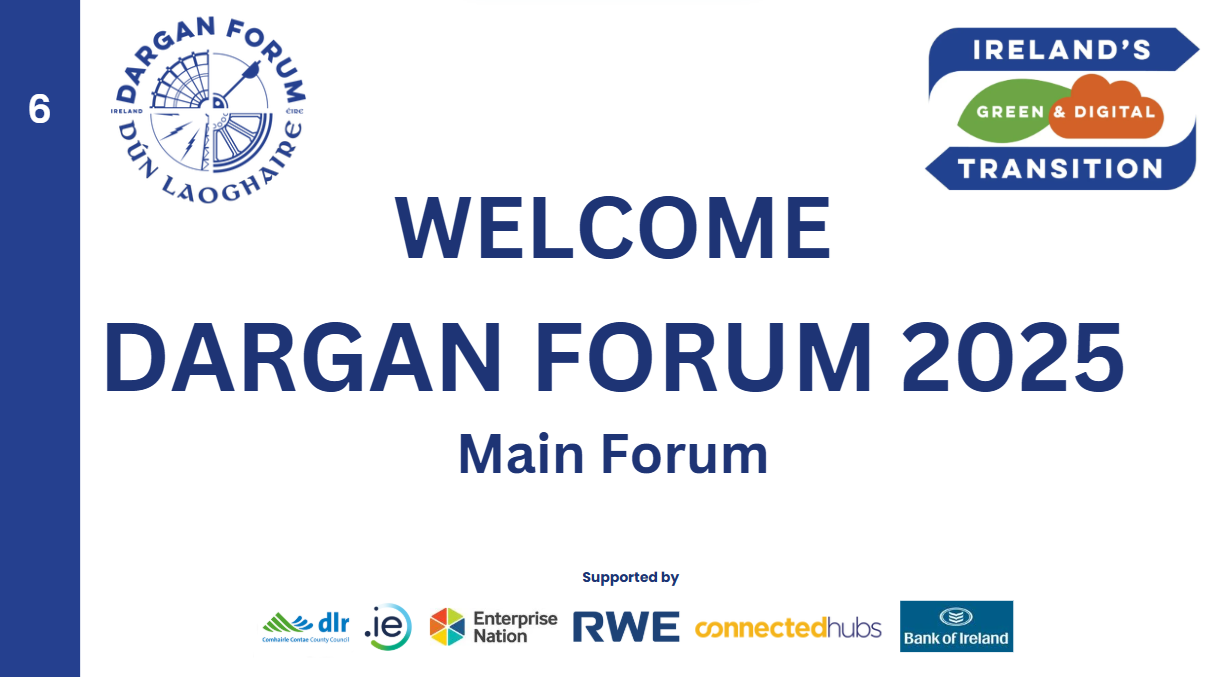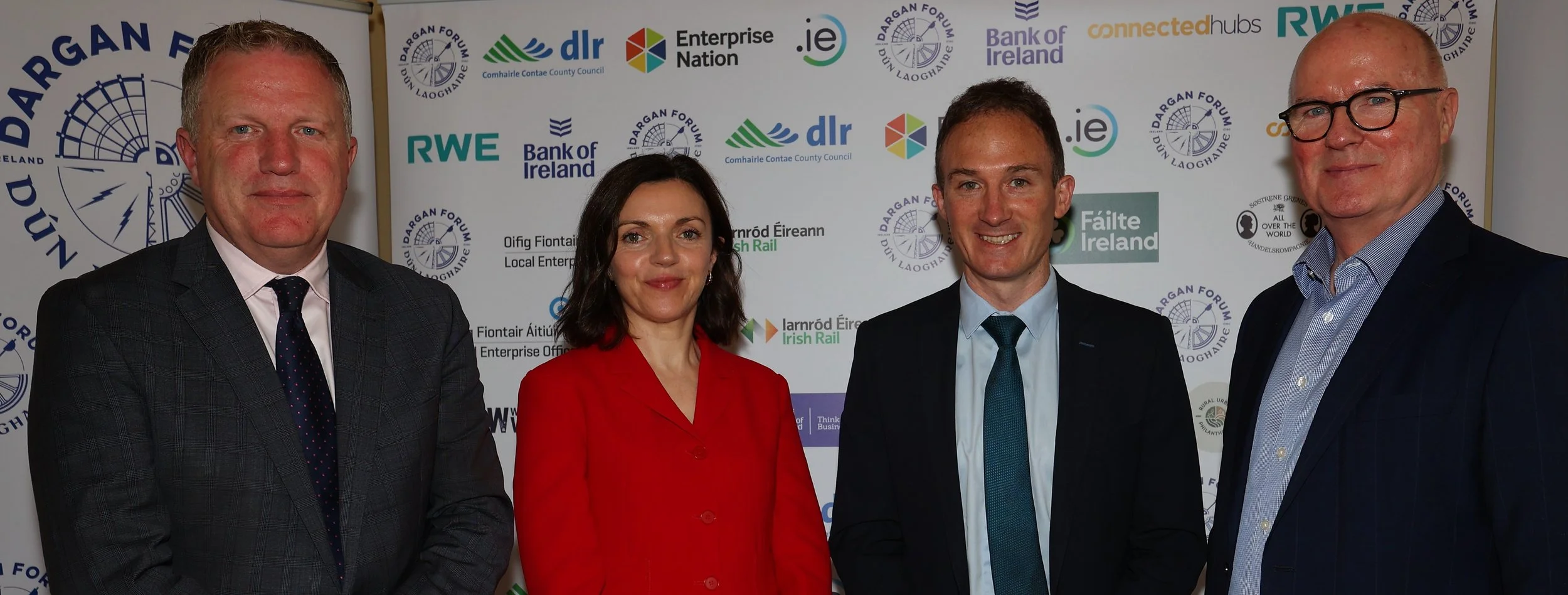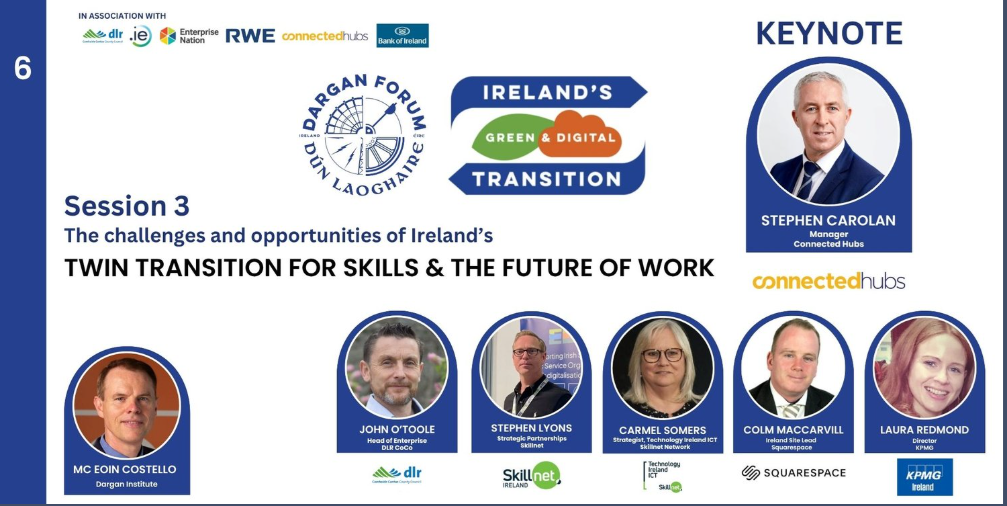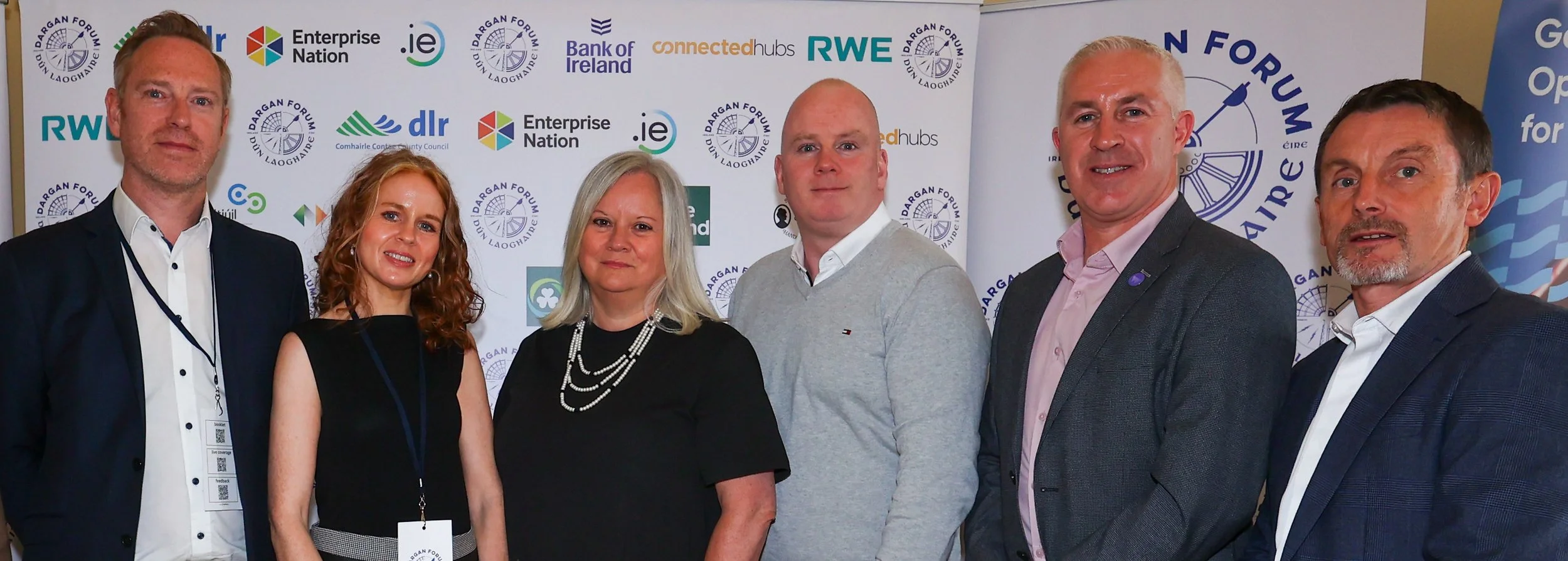Event 6 The Main Forum - Dargan Forum 2025: Ireland’s Twin Transition in Action
The flagship Dargan Forum event brought together local government leaders, policymakers, innovators, and business figures from across Ireland and beyond to discuss how our communities, systems and local economies must adapt to the dual challenges of digital transformation and climate action. With four compelling sessions and a wide array of voices, the event was a showcase for inclusive progress—locally rooted, globally aware.
🔹 Opening Session: From Local Leadership to Global Disruption
Speakers:
Eoin Costello, Director, Dargan Institute
Jim Gildea, Cathaoirleach, Dún Laoghaire-Rathdown County Council
Adam Dorr, Director of Research, RethinkX
Adam Dorr, Rethink X, Ron McNamara, Board member Dargan Institute, Nada Pupovac, Marketing manager, Dargan Institute, Cathaoirleach Jim Gildea DLR CoCo, Eoin Costello, Director, Dargan Institute, Gerard Corcoran, Board member Dargan Institute.
Eoin Costello opened the day by sharing the vision behind the Dargan Forum: a platform that bridges thought leadership with practical action across Ireland’s twin transitions.
“The Forum is about sparking practical collaboration. If we want change to stick, it has to start at the level of the locality where people live and work.”
He underlined the need for new public conversations that include the SME sector, regional actors, and international perspectives, framing the day as a space for those connections to form.
Jim Gildea paid tribute to William Dargan and stressed the importance of vision at the local level.
“The Dargan Forum is not just a series of talks—it’s a call to action rooted in local leadership.”
Gildea spoke about the role of local government as a proactive shaper of Ireland’s future, particularly in championing regional innovation and inclusive economic development.
Adam Dorr delivered a thought-provoking keynote on exponential technological disruption.
“The future isn’t linear. Solar, autonomous transport, and AI will change everything—and faster than most expect.”
He explained that traditional forecasting models fail to account for exponential growth, urging Irish policymakers and planners to embrace bold, systems-level thinking to avoid becoming locked into obsolete infrastructure and policies.
Session 1: The Digital Transition – Skills, Infrastructure & Trust
Panel for session 1 included Sean Buckley, Area Director, Bank of Ireland, Joanne Mangan, Country Manager Enterprise Nation, Alan Dillon T.D. Minister of State for Small Business and Retail & Circular Economy, David Curtin, CEO .ie
Keynote: Alan Dillon, Minister of State for Small Business, Retail, and the Circular Economy
Minister of State Alan Dillon outlined the government’s roadmap for digital transformation, especially for Ireland’s SMEs.
“Small businesses must be part of our digital story—from Mayo to Monkstown.”
He highlighted the importance of equipping small enterprises with the skills and tools to thrive in a rapidly changing landscape, and reinforced the government’s commitment to regional balance in digital policy.
Sean Buckley, Area Director, Bank of Ireland connected digital adoption to financial empowerment.
“Digital adoption and financial literacy go hand-in-hand for Irish SMEs.”
He highlighted how banks can serve as bridges for businesses making the leap into digital tools and data-driven growth strategies. He emphasised that his approach is to support customers
Joanne Mangan Country Manager of Enterprise Nation Ireland spotlighted the unique challenges of microbusinesses and solo entrepreneurs.
“If you're a one-person business, you're also the IT department. We need to make digital tools accessible, not intimidating.”
She urged policymakers and platforms to design with simplicity and empathy, advocating for programs that reduce friction for time-pressed entrepreneurs.
David Curtin of .ie framed digital identity as a matter of local trust.
“The .ie domain is more than an address—it’s a signal of local legitimacy.”
He spoke about how SMEs benefit from being visibly Irish online, and how trust in digital spaces will be essential for the future of e-commerce and civic interaction.
Session 2: The Green Transition – Energy, Transport & Climate Infrastructure
The Panel for Session 2 - Jim Scheer, SEAI, James Phelan, DLR CoCo, Jennifer Carroll MacNeill, Minister for Health, Paul Higgins, Renewables Ireland, Michael Power, Iarnrod Eireann, Frank Curran, DLR CoCo CEO, Vanessa O'Connell, RWE Dublin Array
Keynotes:
Frank Curran, CEO, DLR CoCo
Vanessa O’Connell, Project Director, RWE Dublin Array
Frank Curran framed local government as the engine room of the green transition.
“Councils are where the climate transition meets concrete reality—literally.”
He detailed how Dún Laoghaire-Rathdown is embedding sustainability into planning, procurement, and operations—from retrofitting public buildings to rolling out EV charging infrastructure—and stressed the need for joined-up thinking across departments and jurisdictions.
Vanessa O’Connell of RWE spoke passionately about the scale and importance of the Dublin Array offshore wind project.
“We’re building something future generations will rely on—our challenge is to do it right, and do it fast.”
She outlined how the energy sector must balance urgency with responsibility, working in harmony with local communities and ecosystems to deliver clean, secure energy.
Jim Scheer of SEAI focused on the energy efficiency imperative.
“The energy transition is already happening. The question is: who’s benefitting, and who’s left behind?”
He called for targeted investment to ensure equitable access to clean energy and highlighted the role of deep retrofits and behaviour change in lowering national emissions.
Michael Power of Iarnród Éireann made the case for sustainable transport.
“Public transport is a climate tool—if we use it wisely.”
He discussed rail electrification, intermodal connectivity, and the importance of aligning long-term infrastructure projects with short-term policy goals to maximise environmental impact.
James Phelan of DLR CoCo brought a planning and place-making perspective to the conversation.
“Climate action has to be baked into every planning decision—not sprinkled on afterwards.”
He described how Dún Laoghaire-Rathdown is revising development plans to prioritise compact growth, active travel, and green infrastructure, noting that public buy-in is strongest when the co-benefits—like safer streets or better air quality—are clearly communicated.
Paul Higgins of Renewable Energy Ireland offered insights from the private sector, especially around supply chain mobilisation.
“The pace of delivery must catch up with the scale of ambition. That means removing roadblocks without lowering the bar.”
He argued that Ireland’s targets for renewable generation will only be met if regulatory timelines are streamlined and skills pipelines expanded. He also called for stronger partnerships between public agencies and clean tech firms to accelerate project delivery.
Session 3: The Future of Work – Platforms, Skills & Possibility
The panel for Session 3 - Stephen Lyons Skillnet Ireland, Laura Redmond KPMG, Carmel SomersTechnology Ireland ICT Skillnet Network, Colm MacCarvill Squarespace, Stephen Carolan Connected Hubs, John O’Toole, DLR CoCo Head of Economic Development.
Keynote: Stephen Carolan, Connected Hubs
Stephen Carolan kicked off with a call for distributed access to opportunity.
“The future of work isn’t about cities or rural—it’s about access. That’s what Connected Hubs enable.”
He detailed how Ireland’s national hub network allows people to live where they choose without compromising their careers.
John O’Toole of DLR CoCo outlined the role of local authorities in fostering employment and entrepreneurship ecosystems.
“Our greatest competitive edge is our talent—but we must invest to keep it.”
He spoke about upskilling, inclusion, and employer engagement as essential elements of sustainable economic development.
Paul Mortby of Square gave voice to the career switchers and aspiring entrepreneurs who now form a growing part of the economy.
“Square is making entrepreneurship a real option for people leaving jobs and starting out on their own.”
He shared how Square’s tools help remove complexity for small businesses taking their first digital steps.
Stephen Lyons (Skillnet) and Carmel Somers (Technology Ireland ICT Skillnet) both stressed the importance of continuous learning and inclusive access to reskilling programs.
“The job for life is gone—but the skills for life must evolve too.” – Stephen Lyons
“We must future-proof people, not just jobs.” – Carmel Somers
Colm MacCarvill of Squarespace highlighted the democratising power of intuitive digital platforms:
“We are removing the mystery from running a business online.”
He discussed how Squarespace is enabling users of all backgrounds to set up shop and build their brand with confidence.
Laura Redmond of KPMG concluded by reminding attendees that while technology may change, human fundamentals endure.
“Tech will change—but empathy, adaptability, and purpose will always matter in the workplace.”
She made the case for values-driven leadership in a time of flux.









